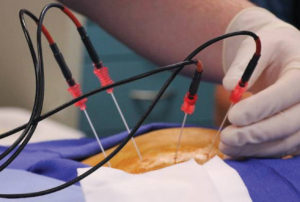 Millions of people are suffering from chronic pain. Some resort to surgery and some may take pain medications to mask the symptoms or just suffer silently through it all, day in and day out, they are alternative treatments that are helping alleviate pain for countless individuals. One of those methods is radiofrequency denervation (RF).
Millions of people are suffering from chronic pain. Some resort to surgery and some may take pain medications to mask the symptoms or just suffer silently through it all, day in and day out, they are alternative treatments that are helping alleviate pain for countless individuals. One of those methods is radiofrequency denervation (RF).
Radiofrequency Denervation
Using light sedation and local anesthesia called radiofrequency denervation is the answer that many individuals are waiting for to alleviate their pain. Neurotransmitters directly sensitize the nerve endings in our bodies via the brain. With radiofrequency denervation, the nerves that are damaged, narrowed, or impinged, are treated with a low-level of localized heat, causing the nerve to stop sending signals to our brain through an interruption in the nerve conduction.
This procedure is entirely safe and effective. It has been used for many years, with long-lasting results for people suffering from pain. The entire process is performed and monitored under fluoroscopy, which is a moving X-ray that is visible to the surgeon on a digital screen. The nerve endings are then located through a probe that is inserted through a tiny needle into the spinal area. Once the damaged nerves are determined, a small lesion is created through the controlled heating of the probe through medium-frequency alternating current. This will alleviate the pain signals to the brain, allowing the patient to be virtually pain-free. The entire procedure takes approximately 20-30 minutes, and patients can resume normal activities within a short period of time. It is easy to reach the nerves of the hip and knee with this approach.
Radiofrequency denervation is able to treat other areas in the body as well. It is commonly used for headaches, facial pain, back pain, complex regional pain syndrome, peripheral neuropathies, trigeminal neuralgia, disc denervation, and neck pain.
A Patients Perspective
About nine months ago, Nancy began to have pain in her neck, shoulders, and arm. She also started to have numbness and tingling in her fingers. “Every time I put my arms up to use my computer, rest them on a table, or even during a manicure, my pain was excruciating. I was in pain 65% of the day.” Nancy explained. Her MRI showed cervical spondylosis, which is narrowing of the vertebrae and impingement of nerves.
Like so many others, she continued to live with her pain with no relief from traditional treatments like NSAIDs (ibuprofen), and massage. When it started to affect her quality of life severely, Nancy knew she had to do something. Her husband told her about Dr. Sunil Panchal’s success in helping many patients with alternative treatment methods.
Nancy had worked in the medical field for over 20 years, and she told her husband that she would never see a pain specialist because Nancy did not believe in that type of patient care, but as time went on, she needed relief and decided to see Dr. Panchal.
“When I met Dr. Panchal, he was very thorough and spent a lot of time with me. He explained that radiofrequency denervation would be a good option, and he also was upfront that sometimes RF takes several attempts to work. I was hesitant at first, decided to give it a try.” Nancy continued, “I had my procedure in early November, and my pain is completely gone. Dr. Panchal is a very meticulous physician; his patient care and follow up is also very impressive. I’ve had three follow up appointments with him since my procedure to track my progress, and things are perfect. In his waiting area, many of the patients like to share their stories, and there are so many people that are pain-free because of his innovative, dedicated care.”
The cervical spine is often afflicted with pain and stiffness due to multiple conditions and alignment issues. Commonly arthritis plays a significant role in cervical spine degeneration, which can lead to a limited range of motion and a great deal of pain, but other conditions affect the cervical spine as well. These can include herniated discs, stenosis, facet dysfunction trauma, and improper posture. RF is an ideal procedure for many patients that want to avoid surgery and addictive medications.
Although surgery is critical in certain situations, finding alternative methods to treat the underlying condition is always the first step. The National Institute of Pain is a state-of-the-art facility that specializes in the treatment of spine and orthopedic conditions, as well as acute and chronic pain management. They provide the utmost quality of care for patients to address the problem directly, and if needed, provide for their pain management needs.
At the National Institute of Pain, they treat each patient individually, using the latest equipment and various innovative procedures to diagnose pain and determine your care needs.
Dr. Sunil Panchal
The National Institute of Pain’s President and Founder, Sunil J. Panchal, MD, is a board-certified interventional pain/ minimally invasive spine physician.
physician. He earned his Bachelor’s degree in Biology from Rensselaer Polytechnic Institute in Troy, NY, and earned his medical degree from Albany Medical College of Union University in Albany, NY. In addition, Dr. Panchal completed The Business of Medicine Graduate Program at Johns Hopkins University in Baltimore, MD. Dr. Panchal completed an internship in general surgery at the University of South Florida in Tampa, a residency in anesthesiology at Northwestern University in Chicago, IL and a fellowship in interventional pain medicine at the University of Illinois in Chicago. He previously served as co-director of the chronic pain service and director of the multidisciplinary pain fellowship training program at Johns Hopkins University and subsequently as director of the division of pain medicine at Cornell University in New York.
He is a member of the North American Spine Society, the North American Neuromodulation Society, the International Neuromodulation Society, and the American Academy of Pain Medicine. Dr. Panchal has authored numerous peer-reviewed journal articles and has served as a reviewer and editor for several journals. He is the co-editor and co-author of the textbook Comprehensive Treatment of Chronic Pain by Medical, Interventional, and Integrative Approaches (2013). Dr. Panchal is a principal investigator in numerous clinical trials, including a current study evaluating sacroiliac joint fusion. Dr. Panchal also served as the Chair of the National Comprehensive Cancer Network Cancer Pain Panel and has lectured widely at the national and international level. He is actively involved in the development of novel analgesics and neurostimulation devices, and in clinical research protocol design.
At The National Institute for Pain, their goal is to strive to deliver the highest quality of comprehensive care for those who are suffering from spine, joint, and nerve injuries. They have many alternatives to help you with your personalized treatment needs. Please visit their website at www.nationalinstituteofpain.org, or call them at (813) 264-PAIN (7246).
The National Institute of Pain
10740 Palm River Rd, Suite 490, Tampa, FL 33619
4911 Van Dyke Rd., Lutz, FL 33558
(813) 264-PAIN (7246)
www.nationalinstituteofpain.org
 Central Florida Health and Wellness Magazine Health and Wellness Articles of the Villages
Central Florida Health and Wellness Magazine Health and Wellness Articles of the Villages



